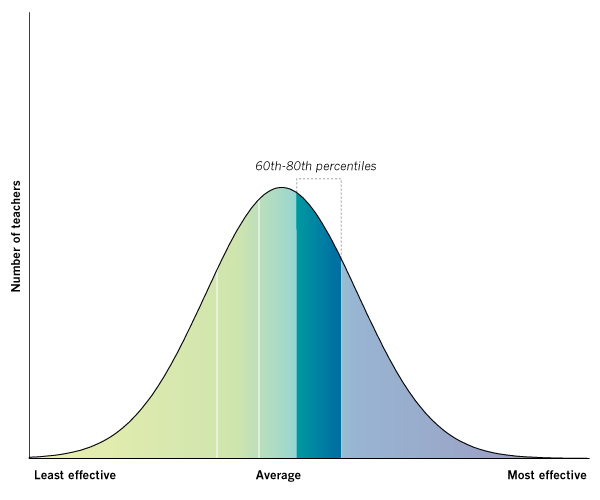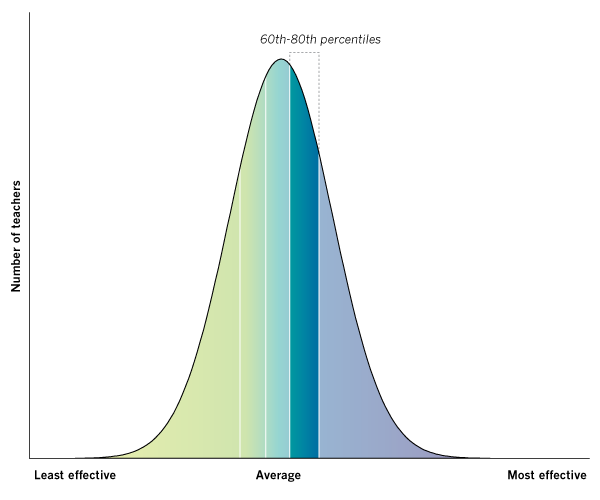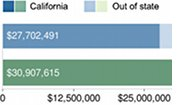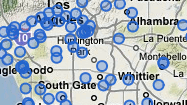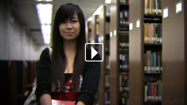Patricia Lynne Berger
A 5th grade teacher at Canterbury Avenue Elementary in 2009
These graphs show a teacher's "value-added" rating based on his or her students' progress on the California Standards Tests in math and English. The Times’ analysis used all valid student scores available for this teacher from the 2002-03 through 2008-09 academic years. The value-added scores reflect a teacher's effectiveness at raising standardized test scores and, as such, capture only one aspect of a teacher's work.
Compared with other Los Angeles Unified teachers on the value-added measure of test score improvement, Berger ranked:
- More effective than average overall.
- More effective than average in math. Students of teachers in this category, on average, gained about 4 percentile points on the California Standards Test compared with other students at their grade level.
- More effective than average in English. Students of teachers in this category, on average, gained about 2 percentile points on the California Standards Test compared with other students at their grade level.
Berger's LAUSD teaching history
2002-03 through 2008-09 academic years
- Canterbury Avenue Elementary, 2009 - 2003
Patricia Berger's Response:

While I do not look bad under your system, I think it is imperative that you understand that test scores alone are not an adequate measurement of a teacher's worth. The last four years I have been an instructor with gifted students. Many of my students have had up to four years of exposure to the arts, and other alternative forms of education, that students in our resident school are not able to access. Statistics have borne out the fact that exposure to the arts throughout a child's academic career enhances their learning ability and creates a more positive feeling about education.
In addition, parents in the gifted program tend to understand the need for parental involvement in their child's education and that may be one of the biggest keys to success for students from all walks of life, across this country. Children of all ages need to hear from an early age that their education is a gift for their future and parents are usually the biggest influence on them.
Additionally, may I say that the use of ONLY test scores to evaluate teachers has little bearing on what is being done in the classroom. I have, in years past, volunteered to have resource students clustered in my room. What that means, at the elementary level, is that in addition to our children that are learning English(who have very specific needs), we have students that may have a gifted designation, as well as at-level students, and then students are integrated into the classroom with OHI designations as well as severe learning difficulties, including autism. Imagine the adapting of lesson plans on a daily, if not hourly, basis in order to meet the needs of these children. I have two dear friends who entered the profession of teaching because they love children and want to see them succeed. They have repeatedly volunteered to work with these special needs clusters and, while their students do make great strides each year, they are often not high enough to make a difference in your assessment of them as teachers. This past May, one of my 4th grade friends' students went from BB in math in his 3rd grade tests to advanced in math for his 4th grade testing. How is that for excellent teaching??? But your system labeled her as having little effect.
I can excuse a newspaper, somewhat, for not understanding the complicated system that LAUSD teachers work within. For instance, do you know that severely autistic(non-communicative) students in 5th grade must take all the same tests that every other fifth grader takes. Let me list the mandated tests our district has put in place, thus far. In addition to May state testing our 5th graders take Language Arts comprehensive assessments every 6-7 weeks. These include a cold writing test, grammar rules in context, reading comprehension, reading fluency, spelling and vocabulary. In addition, they must take four quarterly math assessments which require that we must fit in all the sections of that particular test within a less than three month period of instruction. Many of the countries in the world that surpass us in mathematics teach a strand per year so the they know their students have a solid base. We teach all strands every year.
Our students are also required to take three district science strand exams often overlapping the other above referenced assessments. All these require lessons crammed into the district's time frame, not the time needed by our students to fully understand the material.
When we became teachers we quickly learned that assessment is a necessary tool to be used to inform your continuing istructional practice so that, hopefully, there are no gaps in our students' learning. In reality, our district has us testing exiting fifth graders with a language arts set, a math assessment, and a science assessment all in the three weeks before they culminate and move on to sixth grade in a different school setting. How helpful do you think those exams are for informing instruction. It is painfully obvious on many of these post-standardized testing exams that our students are DONE. It is nearly impossible to keep their attention on the content, never mind to help them to care about the results that they will not see.
So, do we need a system that will eliminate those few teachers that don't care? Yes. Is this arbitrary, test-score based system helpful? Absolutely not! If you think showing up for the new year with an arbitrary label, knowing we have almost no say in the running of our schools, that we will run out of supplies before the end of the year, that we will have to come out of pocket for supplementary lessons, materials and continuting education, that we still have 7 furlough days to come out of our paychecks(when we have not had a cost of living raise in years) and that the public will continue to judge us based on incomplete and partial reporting--that this is easy? Know that it is not! But know this: the bulk of us will do it and do it well and continue to work hard at improving our practice and meeting the needs of our students---no matter how academically low they come to us, no matter how hurt they are by society, family woes, and an uncaring system. We will do so because we chose this profession of education because we believe that knowledge is the key to a better world for all. Thank you for the opportunity to speak. Patricia Berger, NBCT-Canterbury Avenue
![]() The Times gave LAUSD elementary school teachers rated in this database the opportunity to preview their value-added evaluations and publicly respond. Some issues raised by teachers may be addressed in the FAQ. Teachers who have not commented may do so by contacting The Times.
The Times gave LAUSD elementary school teachers rated in this database the opportunity to preview their value-added evaluations and publicly respond. Some issues raised by teachers may be addressed in the FAQ. Teachers who have not commented may do so by contacting The Times.
|
|
 Delicious
Delicious
|
 Digg
Digg
|
 Facebook
Facebook
|
 Twitter
Twitter
|



